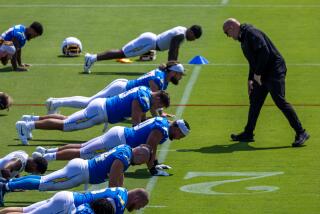Not Just Passing Through : After Coaching Odyssey, Coury Joins Rams
It would seem curious to some that a man of his senses would one day leave his home of 20 years in favor of a life style best suited for Johnny Appleseed.
In fact, so firmly were Dick Coury’s roots planted in Orange County back in 1972 that it would take nearly the strength of all his seven children to wrench his feet from Santa Ana soil.
Dick Coury, celebrated football coach at Mater Dei High School, USC and Cal State Fullerton, was a fixture in the county--much like the berry farm on Beach Boulevard.
He had neatly assembled and attached a little white bow to a niche that included a loving wife, seven kids, a sensible mortgage payment and the life of Riley.
So then, of course, he left.
For however cozy age 42 sounded when it rolled off his lips, it wasn’t enough for Coury to sit back on an IRA account while counting the days till 65.
Coury decided to shoot the moon. He wanted to become a head coach in the National Football League, and knew you didn’t get there by sorting out budget problems of the Cal State Fullertons of the world.
So off he went, to faraway lands and leagues, filling in his resume along the way. There were layovers in Denver, Philadelphia, Portland, Boston and New Orleans.
He was a head coach for the Portland Storm of the old World Football League and then for the Transcontinental (Boston-New Orleans-Portland) Breakers of the United States Football League. The term “meeting payroll” suddenly would take on new meaning. In the alphabet soup leagues, it wasn’t shocking to shake hands with an owner only to have him return someday to borrow money for a soda.
For the Coury family, it was a 14-year odyssey filled with escrow closings and U-Haul bills.
So, when the Portland Bank-Breakers of the USFL quit paying him and his team last summer, Coury decided to come home.
A few weeks ago, the Rams hired him as their quarterback coach, hoping he’ll mean to the position what Red Adair did to oil fires.
Coury says it’s nice to be back.
“My wife says there’s only one cause for divorce, and that’s if I join another new football league,” Coury said.
As for that NFL head coaching job, well . . .
“If I couldn’t be a head coach, then this is the best thing that could have happened,” Coury, 56, said. “I’ve always wanted to be a head coach. I still have that aspiration. That’s what I want to do some day. But if you can choose a place to be an assistant, it would be for the Rams.”
The Courys have returned to Orange County and say they’ll keep a home here no matter what happens next.
The pain of being again overlooked for a head NFL coaching job doesn’t show in Coury’s face.
“They’re awfully hard to get,” Coury said. “I’ve been close two times. To land one, you have to be pretty fortunate. Heck, there are only 28 of them. This year, there were only four that were open. You’re talking about four jobs in the entire world.”
Coury thought he was close in 1981 with the New Orleans Saints before they hired Bum Phillips, then again after the 1985 season when the Houston Oilers fired Hugh Campbell. Coury was told the Oilers were looking outside the organization for a successor and most figured Coury the top candidate. But the Oilers instead promoted assistant Jerry Glanville.
It was then that Coury contacted the Rams.
The Rams were looking to add some fresh ideas to their passing game which, at last glance at NFL statistics, needed some freshening up.
In Coury they hired one of the game’s most innovative offensive minds and a guy who has had pretty good luck with quarterbacks.
At Mater Dei, Coury coached John Huarte, who later won the Heisman Trophy at Notre Dame. In 1983, Coury was the USFL’s Coach of the Year, thanks in part to the performance of aging quarterback Johnnie Walton, who passed for 3,772 yards.
A few weeks ago, Coury met the Rams’ quarterback, Dieter Brock.
So should Ram fans start licking their lips?
With the Breakers, Coury featured in every game a wacky play designed by a contributing fan. It was one of those popular USFL gimmicks, created to boost interest. Sometimes the plays really worked.
It’s no secret that Coury loves to pass, pass, pass.
But before anyone gets too excited, remember that John Robinson still is the head coach and he fancies winning games the old-fashioned way--on the ground.
“Really, my only job is to coach the quarterbacks,” Coury said. “Every time the quarterback moves, I’ll be watching him, making sure he’s following the offensive plan. Hopefully, I can add some thoughts to the passing game. I always thought I knew the passing game.”
With the Rams, he’ll be introduced to the attack that finished 28th in a league of 28 teams. With the Rams, he’ll work with a quarterback who’s much safer these days away from public places.
As duly noted in popularity polls around town, it will be a while before people forget Brock’s passing performance (10 for 31 and one interception) against the Bears in the NFC title game.
Recently, Coury dined with Brock and his wife. It was a social meeting, though Coury couldn’t help breaking the ice with a joke.
“I just asked him if he was still walking around in public,” Coury said. In his month with the Rams, Coury has studied roll after roll of game film. He’s seen more of Dieter Brock than one should be allowed.
But, amazing as it may sound, Coury says Brock’s not all that bad.
“I think he’s a much better quarterback than his reputation right now,” he said. “For a guy who’s taken all the abuse he’s taken, I think he’s handled it well. He doesn’t seem scarred, though I don’t know how he could avoid it.”
Coury said Brock is being judged primarily on one bad performance.
“He’s taken a lot of heat based on the Bear game,” Coury said. “That’s the last thing you remember. It’s unfortunate for him, because if you use that same criteria, then (New England quarterback) Tony Eason may never play again after what you saw in the Super Bowl.”
Coury’s plan with the Rams is to always be situated close to one of Robinson’s ears, the idea being if Coury whispers “pass” in there often enough, the coach might listen.
“I’m not a guy who wants to throw every down,” Coury said. “But it’s tough to score without big plays, and it’s tough to get big plays with the running game. The running game here is as good as any in pro football. But when you throw the ball, you can make it more effective. I’m a pass-oriented guy. Of course, it’s a lot easier for an assistant coach to want to throw every down than it is for a head coach. I’ve been in both shoes.”
That he has.
His career began as a player in his hometown of Athens, Ohio, where Coury starred at quarterback for Athens High. He played a year at Notre Dame for Frank Leahy and graduated in 1951. He spent two years in the Army and eventually found his way to Mater Dei in Santa Ana.
In nine years as the head coach there, the Monarchs were 96-9 and won three CIF titles.
In 1967, Coury accepted a job as defensive coordinator under John McKay at USC.
“That was the toughest decision,” Coury said. “I knew if we went there, it would be the beginning of a lot of moves. I wanted to be a head coach, and you may end up anywhere to get it done.”
After three years at USC, Coury hooked on as an assistant with the Pittsburgh Steelers, but in 1969 was offered the chance to start a football program at Cal State Fullerton. Coury accepted, and had two winning seasons.
Coury, though, was greatly affected by the death of three Fullerton assistant coaches, killed in a plane crash while on a scouting trip in November of 1971.
“When that happened, I didn’t feel there was any way I could stay there,” Coury said.
So, in 1972 he moved his family to Denver and became an assistant for the Broncos.
So began the life of a wanderer.
After two years, in Denver, Coury joined the WFL’s Portland Storm.
“In the WFL, for the most part, if you had 10 cents you could get a franchise,” he said.
The league lasted two years before folding.
Coury was a San Diego Chargers assistant for a season before becoming Dick Vermeil’s top assistant with the Philadelphia Eagles. After six seasons, Coury left to join the Breakers of the USFL.
“I thought the USFL was much more stable,” Coury said. “I wouldn’t have gone into it had I known it was another WFL. And, as it turned out for me, it ended up being that way.”
After Coury’s first season in Boston, the team changed ownership and moved to New Orleans. Coury said New Orleans was an ideal football city, but when the USFL announced it was going to move to a fall season in 1986, USFL teams began fleeing NFL cities. Joe Canizaro, owner of the Breakers, moved the team to Portland for the 1985 season.
For Coury and the Breakers, that made it three cities in three years.
Monetary losses were mounting in Portland.
And with four games left in the 1985 season, the checks quit coming.
“Some players lost houses and cars,” Coury said. “It was the guys who were making 40 to 50 thousand that got hurt more than anyone else.”
The players still have a lawsuit pending against Canizaro and the league. Coury and his coaches reached a settlement with Canizaro for a fraction of their contracts.
Of course, part of the fun in moving is becoming a homeowner.
“We bought a home in Denver, and then we bought another one in Portland when I went to the WFL,” Coury said, tracing his tracks. “Then we bought a home in Philadelphia, and then one in Boston when I went to the USFL.”
But before Coury could move into his Boston home, the team announced it was moving to New Orleans.
When the Breakers moved to Portland, Coury took a chance and bought another house there.
“It was strange because I would move and keep the same team,” Coury said.
The Coury family was left scattered across the nation, but six of his seven children eventually migrated back to Southern California.
And that’s why Coury wanted to come home.
“We never lost the feeling that these were our roots,” Coury said. “We liked that feeling. This year, when our USFL team folded, we said that wherever we ended up we were going to buy a home in Orange County and then rent wherever we go.”
But still, there is some unsettled business to attend to.
“I coached here for 20 years,” Coury said. “Coming back is kind of a dream come true. But the experience in the USFL proved I could be a head coach. I still think I can have my own team. I’m not giving up on that.”



